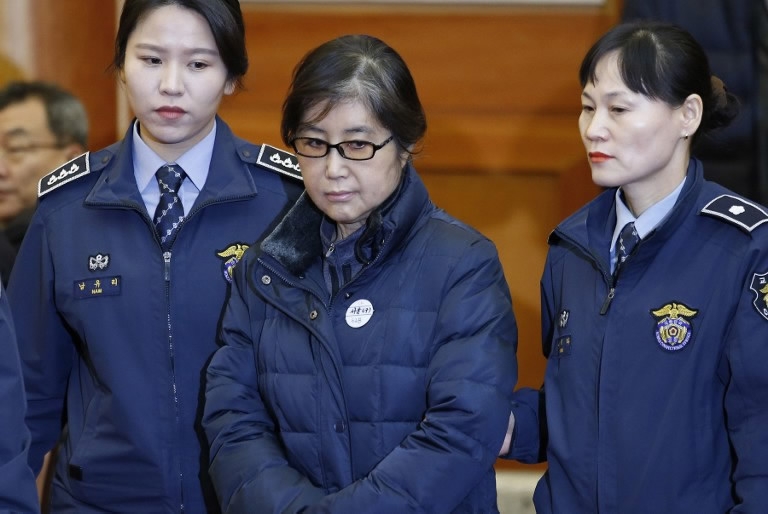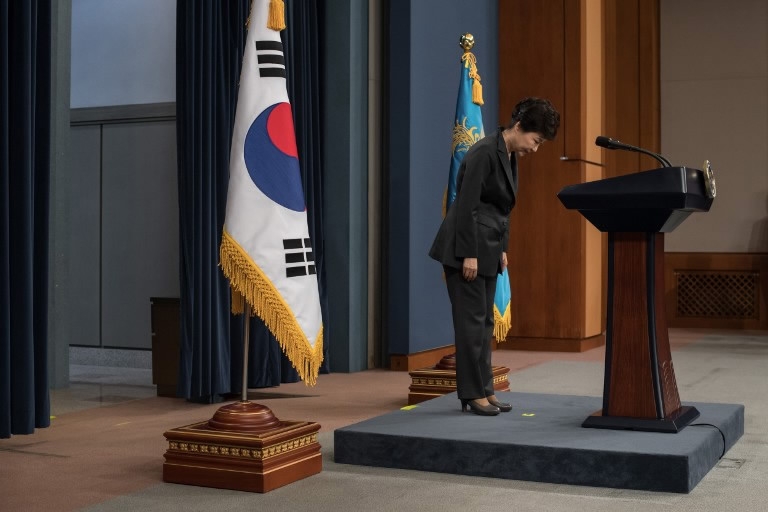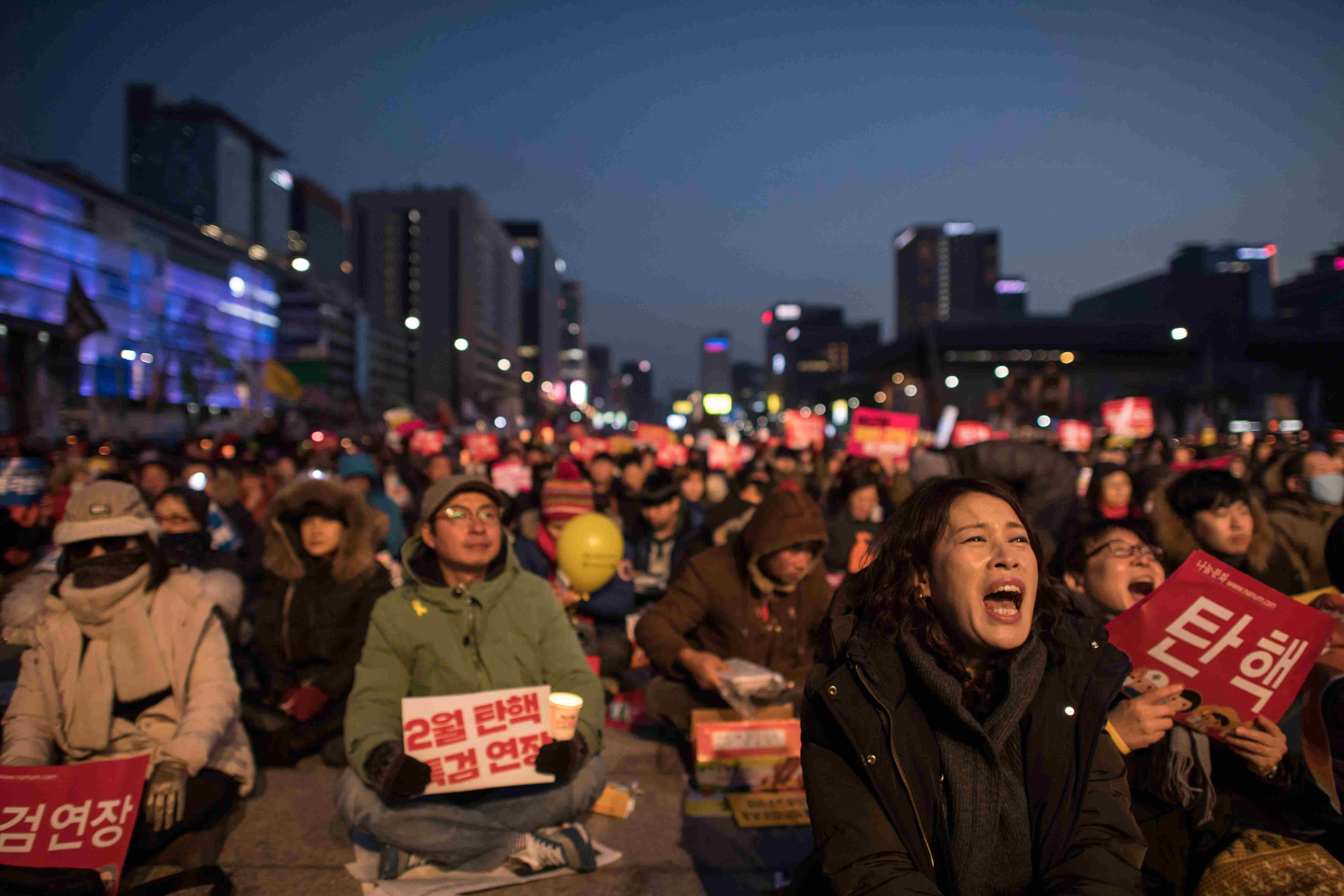Guest commentary by Shastri Ramachandaran
When Park Geun-hye became South Korean president in February 2013 on a highly promising note, few expected her plunge to ignominy in four years. Yet, that is precisely what happened. Far from fulfilling the hopes by blazing a new trail in policies, Park became mired in controversy and scandals that have felled her politically. Facing impeachment, she stands discredited.

Choi Soon-sil (C), the woman at the centre of the South Korean political scandal and long-time friend of President Park Geun-hye, arrives for hearing arguments for South Korean President Park Geun-hye's impeachment trial at the Constitutional Court in Seoul on January 16, 2017. /AFP Photo
Park’s relationship with the scandal-ridden Choi Soon-sil, her longtime confidante, was the cause of much controversy and prolonged protests. The relationship also gave rise to charges of corruption – involving misuse of presidential powers and prerogatives, influence peddling, and extortion from business houses – against her. Park also is accused of letting Choi usurp her authority to order officials, set policy and make decisions. The resultant public anger forced Park to apologize for Choi’s misuse of her presidential office. Her powers have been suspended pending the outcome of the impeachment trial now underway.
This is a big fall for any head of state, more so for Park who, as former President Park Chung-hee’s daughter, was no stranger to the presidential house. Besides, she was South Korea’s first female head of state - a great achievement given the country’s gender inequality.

South Korea's President Park Geun-Hye bows prior to delivering an address to the nation at the presidential Blue House in Seoul on November 4, 2016. Park on November 4 agreed to submit to questioning by prosecutors investigating a corruption scandal engulfing her administration, and admitted that the damaging fallout was "all my fault." /AFP Photo
Park’s record in office, however, is mixed. The Democratic People’s Republic of Korea (DPRK) was her biggest challenge. Park promised to strive for “national reconciliation” with the DPRK and, despite a series of provocative missile and nuclear tests, she stayed the course. Relations are still tense, but her proactive engagement policies made the DPRK reciprocate with small steps such as reunions of separated families. Despite the DPRK’s violation of a UN Security Council resolution, in the interests of regional stability, she remained committed to policy coordination along with the UN, China and the US in dealing with the DPRK.
Park maintained good relations with both the US and China, though South Korea agreeing, last year, to host the Terminal High Altitude Area Defense system (THAAD) raised concerns in the region. China is opposed to deployment of this US missile defense system on the ground that it violates China's strategic interests and undermines the strategic mutual interest between China and the US.
She met President Xi Jinping in China in June 2013 and won his support for South Korea’s stand on issues related to the DPRK. In 2015, South Korea applied to join the China-led Asian Infrastructure Investment Bank (AIIB), and Park urged the Asian Development Bank to cooperate with her country as well as AIIB.
Like her predecessors, Park enjoyed close ties with the US, which she visited in 2013 to meet President Barack Obama. She saw the US-South Korean comprehensive strategic alliance as the world’s most successful and had ambitions of making it a global partnership. That, however, did not happen.
She unveiled an inspiring vision for building a "Creative Economy" with a focus on jobs and livelihood opportunities. Her plans for economic revival and job creation made some headway in the early years. But her business links and influence peddling at the behest of Choi led to massive protests, and together these wrecked reforms. Another casualty was her social policy to eradicate the “evils” of violence (sexual, domestic and school) and unsafe food. Statistics show a rise in sexual and domestic violence in her time, and food safety remains a major public concern.

Anti-government activists shout slogans during a protest in central Seoul on February 25, 2017. /AFP Photo
Park is buried under scandal and controversy now, and her record in office isn’t likely to gain any new points of pride. But perhaps history will judge her more kindly than her political contemporaries.
(The author, who worked as senior editor and writer with China Daily and Global Times, is an independent journalist and global affairs commentator based in New Delhi. Previously he was senior consultant and editor of China-India Dialogue. The article reflects the author’s opinion, not necessarily the view of CGTN.)









